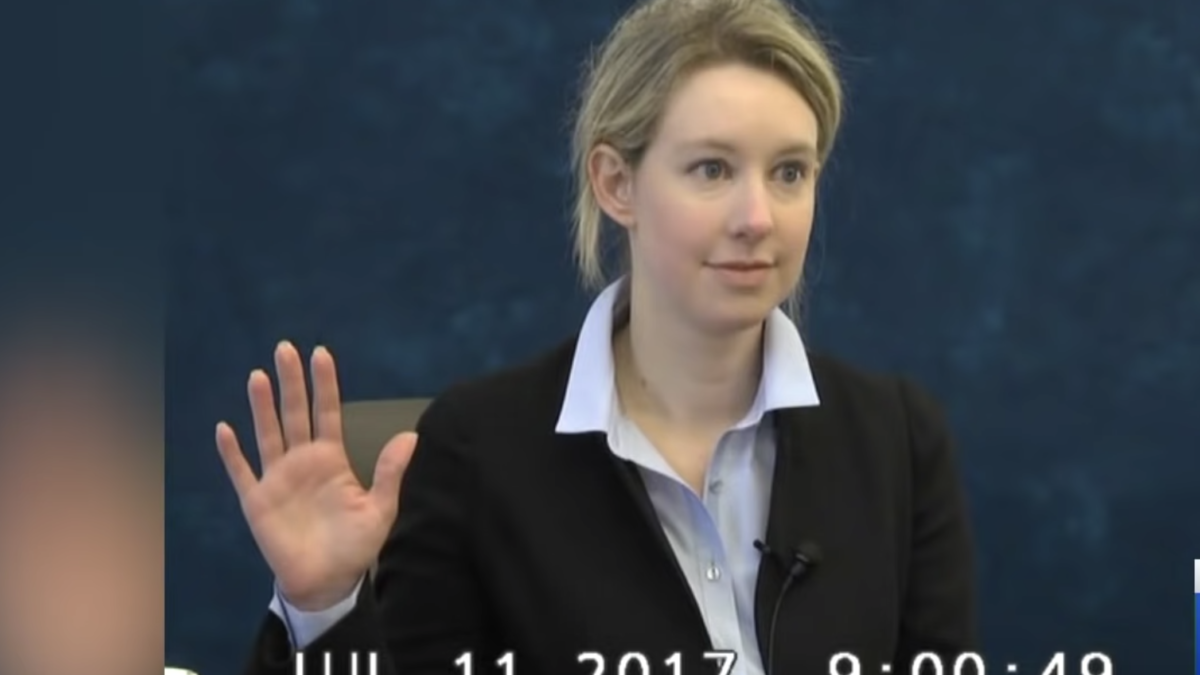A jury found Elizabeth Holmes, the founder and CEO of blood-testing startup Theranos Inc, guilty on four of 11 charges, including conspiring to defraud investors and patients in her company. She could face up to 20 years in prison for each guilty charge. Holmes’s conviction marks a dramatic ending for what was supposed to be a perfect Silicon Valley success story.
In 2003, 19-year-old Holmes dropped out of Stanford University and founded Theranos, a blood-testing startup. Holmes claimed she was going to revolutionize blood-testing and, by extension, the health-care industry.
Her company built a small device that would draw only a droplet of blood from a patient’s fingertip, run a multitude of tests, and return the results within minutes at a fraction of the cost of traditional tests. If it sounds too good to be true, that’s because it was.
Holmes never studied medicine, nor did she have any prior health-care experiences. But she played the part of a visionary entrepreneur well. She’s certainly not the first Silcon Valley giant to embrace the “fake it until you make it” attitude, but with the help of a fawning media, it was easy for her to get away with.
An attractive, media-savvy blonde declaring the affordability of medical tests as “a basic human right” is magazine cover catnip. For years, she only wore a black turtleneck in public, modeling after Apple’s deceased founder Steve Jobs, to whom many compared her.
Even though few inside and outside of her company ever saw a prototype of her machine, the “Edison,” investors were so enticed by Holme’s charisma and vision that they shuffled their money her way. Theranos was valued at $9 billion in 2014, and Holmes became the youngest self-made billionaire in the country with a personal wealth valued at $4.5 billion. Some of the most influential statesmen in the country served on Theranos’ board, including former Secretary of Defense Gen. Jim Mattis, and two former secretaries of state, Henry Kissinger and George Shultz.
Theranos began offering blood tests to the public in Arizona and California through a partnership with Walgreens in 2013. The company claimed that “Edison” could conduct more than 240 tests. Two years later, with the help of whistleblowers, the Wall Street Journal ran a series of articles questioning Theranos’ claim of its technology.
According to the Journal reports, Holmes and some of the staff knew Edison was not reliable, and the number of tests it could run was minimal. The company had to perform the traditional needle-in-the-arm blood draws as part of its testing and relied on commercial blood analyzers to run tests (without informing investors and patients). Sometimes employees had to alter the small amount of blood sample they collected by diluting it to fit the commercial blood test machines, which often led to inaccurate results.
For example, Theranos reportedly told one patient her blood test showed “abnormally elevated levels of glucose, calcium, total protein, and three liver enzymes.” Based on such results, her primary-care doctor worried the patient might be at risk of a stroke and asked her to go to an emergency room. But the hospital’s tests showed there was nothing wrong with the patient.
Former employees interviewed by the Journal also complained about the company’s toxic working environment: Holmes reportedly deployed intimidating tactics, including hiring private investigators to suppress employees from speaking out. The Journal reporting was the beginning of the end of the house of cards Holmes painstakingly built. It turned out that she had sold investors, health-care providers, and patients a dangerous lie.
Since 2015, Theranos has settled several civil suits brought by investors and the Security and Exchange Commission (SEC). In 2016, Theranos closed its medical lab operations because the Centers for Medicare and Medicaid Services (CMS) determined that the California-based lab used by Theranos posed “immediate jeopardy to patient health and safety.”
In 2018, federal prosecutors indicted Holmes and her deputy and former boyfriend, Ramesh “Sunny” Balwani, with two counts of conspiracy to commit wire fraud and ten counts of wire fraud. Theranos went out of business in late 2018. The COVID-19 lockdowns and Elizabeth’s pregnancy delayed her trial to the fall of 2021.
During the trial, federal prosecutors revealed even more disturbing information about Holmes and Theranos, including an exaggeration of Theranos’ involvement with the U.S. military and presenting investors a forged document bearing the Pfizer logo. The company also accumulated losses of more than $585 million from 2003 to 2015.
During the trial, rather than taking personal responsibility, Holmes blamed all Theranos’ problems on her ex-boyfriend and former number two of the company, Balwani. Holmes claimed Balwani “was emotionally and sexually abusive,” and told her how to behave. Balwani’s lawyer has vehemently denied these claims.
Neither Holmes nor her lawyer has provided evidence to support her abusive relationship claims. Prosecutors, however, provided text messages, hand-written notes, and emails between Holmes and Balwani that showed the two seemed to enjoy an affectionate relationship for a long time. In addition, Holmes said publicly many times she was the one in charge of Theranos. Holmes’ guilty conviction shows the jury didn’t buy her abusive relationship claims either.
Both Holmes and her lawyer also insisted that when Holmes spoke of how Theranos’s blood-testing machine would revolutionize health care, she didn’t lie because she sincerely believed it was true, and it was only a matter of time to turn her promise into reality.
“Fake it until you make it” is a widespread mentality among startups in Silicon Valley. Holmes and her lawyer argued that what Holmes had done was no different from CEOs of other startups that merely stretched the truth of their products and services to investors and the public before they had something functional to deliver their promises.
Holmes’s lawyer argued that investors and partners of Theranos only had themselves to blame when they mistook Holmes’ aspiration as facts and failed to conduct thorough due diligence before investing their money. But the prosecutor responded, “A scheme to defraud is still a scheme to defraud even if it would only ensnare someone who is less careful than they should be.”
By some measure, the trial of Holmes was also the trial of the “fake it until you make it” Silicon Valley mentality. Jina Choi, director of the SEC’s San Francisco Regional Office, said in a statement that “The Theranos story is an important lesson for Silicon Valley. Innovators who seek to revolutionize and disrupt an industry must tell investors the truth about what their technology can do today, not just what they hope it might do someday.”
Entrepreneurs should learn from Holmes that wishful thinking is not the same as reality, and that liars will get caught sooner or later. There is also a lesson for future investors: don’t be fooled by the founder’s charisma. Do your homework through comprehensive due diligence, so you don’t end up throwing money down the drain.








